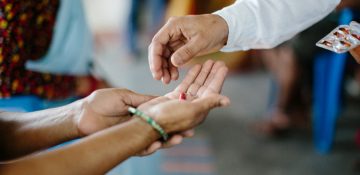PEP++
NLR targets the closest contacts of leprosy patients that were detected over the past five years. Those who test positive are given an enhanced preventative treatment (PEP++). Other contacts receive a single dose of rifampicin (SDR-PEP) to also reduce their risk of developing leprosy.

Reaching and treating contacts of leprosy patients is key in the interruption of leprosy transmission, as it is they who have the highest relative risk of developing the disease. To achieve Sustainable Development Goal 3 – a 90% reduction in the number of people requiring treatment for neglected tropical diseases (including leprosy) – new approaches are urgently needed. NLR’s flagship approach to achieve this goal is called PEP++.
Enhanced preventive treatment (PEP++)
The project’s multi-centre research programme uses a new, more robust preventive chemotherapy regimen. The current regimen a single-dose rifampicin for post-exposure prophylaxis (SDR-PEP) of leprosy, reduces the risk of leprosy among contacts of new patients by 57%. We expect that three doses of the new PEP++ regimen, a combination of rifampicin/clarithromycin is expected to be 80-90% effective. The medication will be administered to a random sample of close contacts in multiple doses. These people are more likely to harbour a higher number of leprosy bacilli than the general population or may be infected without any visible symptoms yet.
Until the end of 2024 more than 800,000 people will be preventively treated to collect evidence of 80-90% efficacy of the new chemoprophylactic regimen, and in areas where the project runs accomplish a 50% reduction in the number of annual new cases compared to the first-year baseline. With a further continuation of the project beyond 2024, we foresee a 90% reduction in the number of annual new cases by 2030, contributing to the achievement of SDG 3.